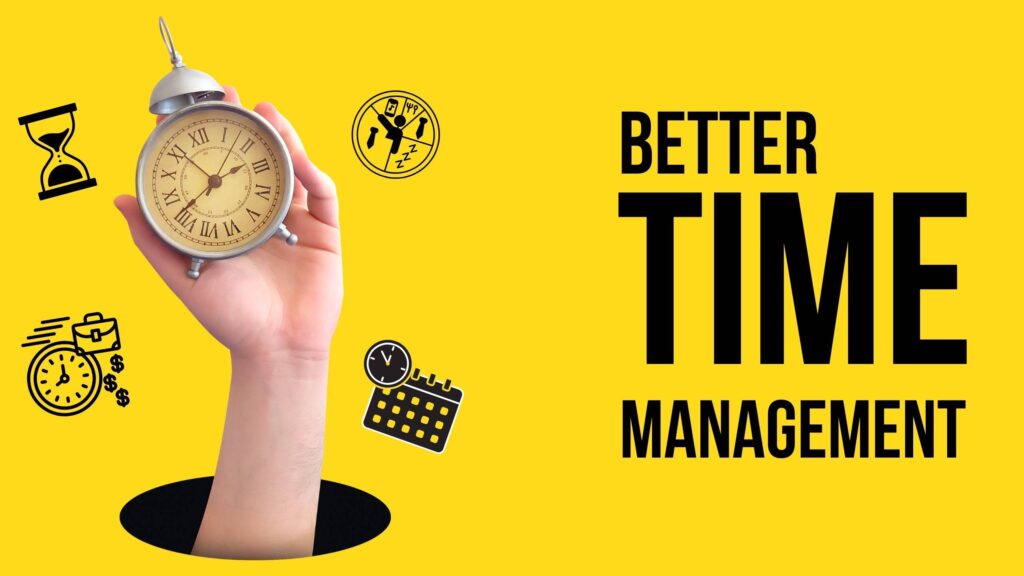Time management is a key factor in achieving success, as it helps individuals prioritize tasks, allocate resources efficiently, and minimize stress. By managing time effectively, people can ensure they remain focused on their goals, make the most of each day, and avoid distractions.
Success often depends on the ability to plan ahead, set clear objectives, and track progress regularly. It requires discipline and consistency, as well as the ability to make adjustments when necessary. Proper time management allows for a balance between work, personal life, and self-care, leading to overall productivity and achievement. Mastering time management can be the difference between reaching one’s potential and falling short of personal or professional goals.
What is Time Management?
Time management is the process of planning and organizing how to divide your time between different tasks or activities. It involves setting priorities, establishing goals, and allocating time effectively to ensure productivity and efficiency. By managing time wisely, individuals can minimize stress, avoid procrastination, and achieve a balance between personal and professional responsibilities. Effective time management helps to maximize the use of available time, leading to improved performance and success in both short-term and long-term objectives.
Is Time Management key to Success?
Yes, time management is an important key to success. Effectively managing time allows individuals to prioritize important tasks, stay organized, and maintain focus on their goals. By setting clear objectives and creating structured plans, people can avoid distractions and prevent procrastination, leading to greater productivity. Good time management also reduces stress and ensures that individuals have enough time for personal well-being and rest, which is essential for long-term success. Those who manage their time wisely are better equipped to achieve their ambitions, meet deadlines, and maintain a healthy work-life balance, all of which contribute significantly to their success.




Importance of Time Management
Effective time management is an essential skill for achieving sustained success in both personal and professional spheres. By optimizing time allocation and prioritization, individuals can enhance productivity, mitigate stress, and maintain a well-rounded, fulfilling lifestyle.
1. Increased Productivity
Better time management enables individuals to prioritize their tasks and focus on what’s most important. By identifying high-priority tasks and tackling them first, you ensure that your time is spent on activities that drive progress and results. This method leads to higher productivity as you work more efficiently, accomplishing more in less time.
2. Reduced Stress
One of the biggest advantages of better time management is a reduction in stress levels. When you plan ahead and manage your schedule well, you are less likely to face last-minute deadlines or the pressure of unfinished tasks. This creates a more relaxed and organized environment, where you can approach your work calmly and confidently, knowing everything is under control.
3. Improved Decision-Making
Effective time management provides you with the mental space and time to think critically and make well-informed decisions. With a well-organized schedule, you’re not rushing through tasks, which allows you to evaluate your options, weigh the pros and cons, and choose the best course of action. This leads to more thoughtful and strategic decisions, both personally and professionally.
4. Enhanced Focus
When you manage your time well, it’s easier to stay focused on the task at hand. Better time management reduces the likelihood of distractions and procrastination. By setting aside specific time blocks for tasks, you create a distraction-free environment where you can immerse yourself fully in your work. This improved focus allows you to complete tasks faster and with better quality, increasing your overall efficiency.
5. Goal Achievement
Better time management is essential for achieving both short-term and long-term goals. By breaking down large goals into smaller, actionable steps and assigning deadlines to each, you can consistently make progress toward them. Time management ensures that you stay on track and avoid missing key milestones, bringing you closer to realizing your aspirations. It also allows for regular assessments of your progress, helping you stay motivated and focused.
6. Work-Life Balance
One of the challenges many people face is balancing their work and personal lives. With better time management, you can create a schedule that accounts for both professional responsibilities and personal time. By efficiently allocating time for work, family, hobbies, and self-care, avoid burnout and maintain a healthier, more balanced lifestyle. Proper time management helps you enjoy life outside of work, ensuring you have time for relaxation and personal growth.
7. Increased Accountability
Managing time effectively encourages responsibility and accountability. When you set deadlines and create a structured schedule, you hold yourself accountable for completing tasks on time. This increases your sense of ownership and commitment to your goals. Time management also helps you track your progress, allowing you to recognize where you’ve excelled and where improvements are needed.
8. Avoidance of Procrastination
Procrastination can be a major roadblock to success, but better time management combats it. By breaking tasks into smaller, manageable chunks and assigning specific time frames for each, you make the process less overwhelming. When tasks are planned and scheduled, it’s easier to take action rather than putting things off. Time management instills discipline and helps you stay on top of your responsibilities without delay.
9. More Free Time
One of the often-overlooked benefits of better time management is the extra time it provides. When you plan your tasks effectively and stay on track, you can finish your work more quickly, leaving more time for leisure and relaxation. This extra time can be used for activities that rejuvenate you, whether it’s spending time with family, pursuing hobbies, or simply resting. In the long run, time management gives you the freedom to enjoy life outside of work.
10. Long-Term Success
Consistently applying better time management practices sets you up for long-term success. With a structured approach to time, you’re able to make steady progress toward your goals, avoid burnout, and sustain productivity over time. Time management helps you focus on growth and improvement, ensuring that you’re always moving forward and achieving your desired outcomes. It also teaches valuable skills like prioritization, planning, and self-discipline that are essential for sustained success in both your personal and professional life.
10 Strategies for Better Time Management
Mastering time management is essential for optimizing productivity and achieving long-term success. Here are 10 effective strategies for better time management that can help you maximize your efficiency and make the most of every moment.
Strategy 1: Prioritize Tasks Using the Eisenhower Matrix
A key strategy for better time management is to prioritize tasks based on their urgency and importance. The Eisenhower Matrix divides tasks into four categories: urgent and important, not urgent but important, urgent but not important, and neither urgent nor important. By clearly identifying which tasks require immediate attention and which can be delegated or postponed, you can focus on high-impact activities, ensuring your time is spent efficiently. This systematic approach reduces the likelihood of wasting time on trivial tasks while emphasizing what contributes to your overarching goals.
Strategy 2: Set Clear, Measurable Goals
Another essential element of better time management is setting clear, measurable goals. Using the SMART framework (Specific, Measurable, Achievable, Relevant, and Time-bound) provides a structured approach to goal-setting, ensuring that you have a clear roadmap for success. By setting these well-defined goals, you can allocate your time purposefully toward activities that contribute directly to your objectives. Measurable goals allow you to track your progress, adjust your plans when necessary, and maintain motivation, ultimately helping you stay on course and accomplish more in less time.
Strategy 3: Create a Structured Daily Schedule:
A structured daily schedule is fundamental for maintaining focus and consistency throughout the day. By mapping out your tasks and allocating specific time slots for each, you avoid the chaos of unplanned work and ensure that every minute is accounted for. A well-planned schedule minimizes decision fatigue, as you know exactly what you should be working on at any given moment. This strategy helps you stay disciplined, prevents procrastination, and ensures that important tasks are completed on time, leading to a more productive and organized day.
Strategy 4: Utilize Time Blocking Techniques
Time blocking is one of the most effective strategies for better time management, as it allows you to dedicate uninterrupted time periods to specific tasks. Instead of jumping from one task to another or multitasking, time blocking encourages focus by reserving fixed blocks of time for each activity. This technique ensures that you give your full attention to a single task, leading to better quality work and increased efficiency. Additionally, by scheduling breaks between blocks, time blocking helps maintain energy levels and prevents burnout, making it easier to stay productive throughout the day.
Strategy 5: Delegate and Outsource Tasks
Effective delegation is an often-overlooked strategy for better time management. Many individuals struggle with delegating tasks, either because they feel the work won’t be done as well or they simply don’t trust others. However, delegating tasks that do not require your personal attention frees up valuable time for you to focus on higher-priority responsibilities. Whether at work or in your personal life, entrusting tasks to others can significantly improve your productivity. Outsourcing administrative tasks, hiring support staff, or collaborating with colleagues can lighten your workload and allow you to dedicate more time to strategic decision-making and long-term goals.
Strategy 6: Eliminate Time Wasters
To achieve better time management, it’s crucial to identify and eliminate time-wasting activities that do not contribute to your goals. Time wasters can come in many forms, from excessive social media use to unnecessary meetings or spending too much time on low-priority tasks. Being mindful of how you spend your time is essential in maximizing productivity. Establish boundaries for non-productive activities, such as limiting the time spent on emails or setting specific periods for checking social media. By cutting down on distractions and focusing only on essential tasks, you can ensure that your time is dedicated to meaningful work.
Strategy 7: Implement the Pomodoro Technique
Pomodoro Technique is a widely-used time management method that promotes focus and productivity through intervals of work and rest. In this technique, you work for 25-minute blocks, known as “Pomodoros,” followed by a short 5-minute break. After completing four Pomodoros, you take a longer 15-30 minute break. This approach helps sustain high levels of concentration by balancing periods of focused work with breaks to recharge. By using the Pomodoro Technique, you can maintain mental clarity, reduce burnout, and keep productivity levels consistent throughout the day.
Strategy 8: Review and Adjust Regularly
Regularly reviewing your time management strategies is crucial for staying on track and improving over time. At the end of each day or week, take a moment to assess how well you’ve managed your time. Identify which tasks were completed efficiently, which ones were delayed, and what led to any setbacks. By analyzing your performance, you can adjust your strategies, eliminate inefficiencies, and fine-tune your approach to ensure that you continue making progress toward your goals. This process of continual reflection and adjustment helps you stay aligned with your objectives while improving your time management skills.
Strategy 9: Learn to Say No
Mastering the art of saying no is a vital skill for better time management. While it’s important to be helpful and open to opportunities, it’s equally important to recognize when a task or commitment doesn’t align with your current priorities. By learning to turn down invitations or requests that are not aligned with your goals or values, you protect your time and ensure that it’s spent on what matters most. Saying no can be challenging, but it’s necessary for maintaining control over your schedule and avoiding over-commitment, which can lead to burnout and reduced productivity.
Strategy 10: Use Technology for Automation
Leveraging technology is essential for better time management. There are numerous apps and tools available to streamline tasks and automate repetitive activities. Whether it’s scheduling meetings, managing emails, or tracking project milestones, technology can help save significant amounts of time. Tools such as calendar apps, project management software, and automated reminder systems reduce manual effort, minimize the risk of human error, and ensure that you stay organized. By integrating these technologies into your workflow, you can optimize your daily routine, reduce administrative burdens, and stay focused on your core responsibilities.
Different Ways to Promote Better Time Management
Effective time management is an indispensable skill for personal and professional success. Promoting better time management requires adopting structured approaches, leveraging tools, and cultivating habits that enhance productivity and efficiency. Below are various strategies to help individuals and organizations foster better time management practices.
1. Establish Clear Objectives
Setting clear and well-defined objectives is foundational to better time management. When goals are specific and aligned with priorities, it becomes easier to allocate time and resources effectively. Breaking larger goals into manageable tasks provides a clear roadmap and prevents overwhelm.
2. Utilize Technology and Tools
Incorporating technology into daily routines can significantly enhance time management. Tools like project management software, calendar apps, and task trackers enable individuals to organize schedules, set reminders, and monitor progress. Automation of repetitive tasks also saves time and reduces manual effort.
3. Prioritize Tasks Strategically
A strategic approach to prioritization is essential for better time management. Utilizing methods like the Eisenhower Matrix or ABC prioritization helps individuals identify tasks that require immediate attention versus those that can be deferred or delegated. This ensures critical responsibilities are addressed promptly.
4. Adopt Time-Blocking Techniques
Time-blocking is a powerful technique to manage time efficiently. By assigning specific time slots for tasks, individuals can focus solely on one activity at a time, minimizing distractions. This approach fosters deep work, enhances concentration, and ensures that all tasks receive the attention they deserve.
5. Encourage Regular Reviews and Adjustments
Periodic reviews of schedules and productivity levels are crucial for better time management. By reflecting on what works and what doesn’t, individuals can fine-tune their routines and eliminate inefficiencies. Regular adjustments ensure alignment with evolving goals and priorities.
6. Promote a Balanced Workload
Overloading oneself with tasks can lead to burnout and reduced productivity. Encouraging a balanced workload is key to promoting better time management. This involves setting realistic expectations, delegating responsibilities, and incorporating adequate breaks to maintain energy levels.
7. Educate on the Importance of Saying No
Learning to say no is a critical skill in time management. Overcommitting can dilute focus and hinder productivity. Encouraging individuals to assess the value of opportunities before agreeing to them helps protect their time for high-priority activities.
8. Foster a Proactive Mindset
Being proactive rather than reactive is a hallmark of better time management. Anticipating potential challenges, planning ahead, and preparing contingency strategies ensure smoother workflows. A proactive approach minimizes last-minute stress and improves overall efficiency.
9. Integrate Flexibility in Planning
While structured planning is essential, it’s equally important to incorporate flexibility. Unexpected interruptions are inevitable, and being adaptable ensures that minor setbacks do not derail productivity. Flexible planning also allows room for creativity and innovation.
10. Promote a Culture of Accountability
In organizational settings, fostering accountability can significantly enhance time management. Setting clear expectations, regularly tracking progress, and celebrating achievements motivate individuals to manage their time effectively. Accountability also encourages a sense of responsibility for one’s commitments.
Improving Better Time Management Skills at Work
Mastering better time management at work is a critical component of professional success, fostering productivity, reducing stress, and enhancing overall job performance. By adopting strategic approaches, employees can effectively allocate their time to tasks that align with organizational goals while ensuring personal growth. Here are ways to refine better time management skills in the workplace.
1. Set Clear Work Priorities
Identifying and focusing on high-priority tasks is a cornerstone of better time management. Begin each day by creating a to-do list and categorizing tasks based on urgency and importance. This approach minimizes wasted time on less critical activities and ensures that essential objectives are met within deadlines.
2. Leverage Time Management Tools
Utilizing tools such as digital calendars, project management software, and task trackers can streamline workflows. These tools enable employees to plan, organize, and monitor tasks effectively, reducing the chances of missed deadlines and enhancing overall productivity.
3. Implement Time-Blocking Techniques
Time-blocking involves allocating specific time periods for individual tasks or groups of related activities. By dedicating uninterrupted blocks of time to focused work, employees can reduce distractions, increase concentration, and achieve higher-quality results.
4. Break Tasks into Manageable Steps
Large projects can be overwhelming, leading to procrastination or inefficiency. Breaking complex tasks into smaller, manageable steps ensures steady progress and makes the overall workload more approachable. This strategy aligns with better time management by maintaining momentum and focus.
5. Practice Effective Delegation
Delegation is an invaluable skill for improving better time management. Assigning tasks to colleagues or team members based on their strengths and expertise not only optimizes resource utilization but also allows employees to concentrate on higher-priority responsibilities.
6. Limit Distractions and Interruptions
Workplace distractions, such as unnecessary meetings, excessive emails, and frequent notifications, can significantly hinder productivity. Establishing boundaries, such as setting “focus hours” or using do-not-disturb modes, can help create an environment conducive to better time management.
7. Adopt the Pomodoro Technique
Pomodoro Technique is a simple yet effective method to manage time better. Employees work in focused intervals (e.g., 25 minutes), followed by short breaks. This cycle enhances focus, reduces mental fatigue, and ensures consistent productivity throughout the day.
8. Develop Proactive Planning Habits
Planning the workday in advance fosters better time management. Employees can review their schedules, anticipate challenges, and prepare solutions to mitigate potential delays. Proactive planning minimizes last-minute stress and promotes a seamless workflow.
9. Attend Training on Time Management
Investing in professional development programs focused on time management can enhance skills and introduce employees to advanced techniques. Training sessions often provide insights into prioritization, goal-setting, and overcoming time-wasting habits.
10. Foster Self-Discipline and Accountability
Self-discipline is crucial for better time management in the workplace. Employees must commit to their schedules, resist procrastination, and remain accountable for their progress. Regular self-assessment helps identify areas of improvement and reinforces positive habits.
11. Incorporate Regular Breaks
Taking regular breaks during the workday is essential for maintaining focus and energy levels. Short pauses allow employees to recharge, return to tasks with renewed clarity, and avoid burnout—ultimately supporting better time management practices.
12. Communicate Effectively
Clear communication with colleagues and supervisors can prevent misunderstandings and redundant work. By establishing expectations, clarifying responsibilities, and seeking feedback, employees can align their efforts with team goals and use their time more effectively.
Better time management is the foundation of success, combining clear priorities with effective strategies. By understanding its importance, adopting proven techniques, and refining time management skills, individuals can achieve greater productivity and long-term success.
FAQs
1. What is time management, and why is it important?
Time management involves organizing and planning how to divide your time between different tasks efficiently. It helps you:
- Achieve goals faster
- Reduce stress
- Increase productivity
- Maintain a work-life balance
2. How can I identify and prioritize my tasks effectively?
To prioritize tasks:
- List all tasks: Write down everything you need to do.
- Use prioritization methods: Techniques like the Eisenhower Matrix (urgent vs. important) or ABCD method help.
- Set deadlines: Assign realistic due dates.
- Focus on key goals: Start with high-priority items that align with your objectives.
3. What are the best tools for time management?
Some popular tools include:
- Digital Calendars: Google Calendar, Microsoft Outlook
- Task Managers: Todoist, Asana, Trello
- Pomodoro Timers: Focus Booster, Toggl
- Note Apps: Evernote, Notion
4. How do I handle procrastination?
Combat procrastination by:
- Breaking tasks into smaller steps
- Using a timer (e.g., Pomodoro technique)
- Eliminating distractions
- Setting rewards for completing tasks
- Focusing on one task at a time
5. What are some effective time management techniques?
Popular techniques include:
- Pomodoro Technique: Work for 25 minutes, then take a 5-minute break.
- Time Blocking: Allocate specific hours for tasks.
- Eat the Frog: Tackle the most challenging task first.
- Pareto Principle (80/20 Rule): Focus on the 20% of tasks that yield 80% of results.
6. How can I balance work and personal life?
- Set clear boundaries between work and personal time.
- Prioritize self-care, such as exercise and relaxation.
- Delegate tasks when possible.
- Use your calendar to schedule both work and leisure activities.
7. How do I deal with unexpected interruptions?
- Plan for flexibility: Leave buffer time between tasks.
- Assess urgency: Address only urgent and important interruptions immediately.
- Politely decline non-essential requests or reschedule them.
8. How do I stay motivated to stick to my schedule?
- Set specific, measurable goals.
- Use visual reminders like to-do lists.
- Celebrate small wins.
- Keep track of your progress.
9. Can multitasking improve time managemen
No, multitasking often reduces efficiency and increases errors. Focus on single-tasking by concentrating fully on one task at a time for better results.
10. How do I measure the effectiveness of my time management?
Track your time usage:
- Use apps like RescueTime or Clockify.
- Compare planned vs. actual time spent.
- Review your progress weekly and adjust strategies if needed.










